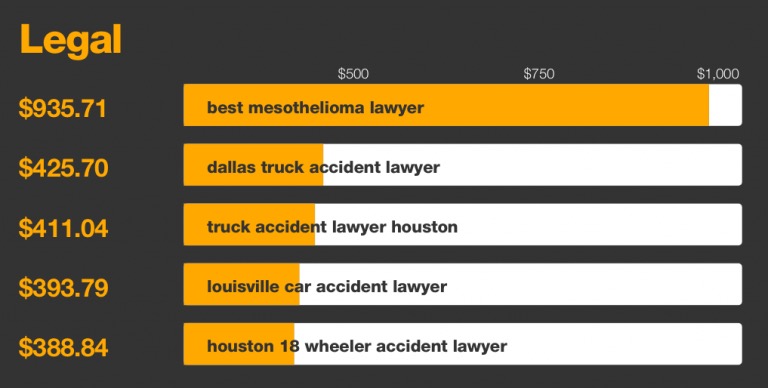At the time this post was written, Google is on track to make more than $70bn in revenue in 2016, and the lion’s share of that number will be generated by its insanely successful advertising model — AdWords. The year is now 2024 — and this has since been rebranded as Google Ads.
Advertisers pay a fee every time somebody clicks on a link in one of their ads. Some of the costs per click being paid are absolutely staggering, though they must be worth it, from the advertiser’s perspective.
Last month I analysed a large chunk of Google Adwords data from SEMrush to discover the most expensive keywords in the UK. Today, I’m releasing the same research for the US. The old adage suggests that everything is bigger in the States, and that certainly seems to apply to advertising expenditure.
So, here are the top 100 terms, based on a massive dataset of 80m keywords:
As you can see, the legal sector dominates, with the most expensive term closing in on a truly incredible $1,000 per click. It sounds insane, but consider that the average mesothelioma settlement is in excess of $1m and it starts to make a lot of sense. Legal terms account for 78% of the top 100, and nine of the top 10.
Water damage is another big ticket item, with clicks costing more than $250 for the top terms. Repair costs and associated claims for water damage into the tens of thousands, so again, it figures.

The other sectors that need to spend big to make an impression include Finance (largely focused on insurance), B2B (typically around the provision of business telephony) and Health (the top terms being linked to rehab).
One of the most obvious difference between the UK and US research is the total absence of any terms related to gambling in the latter country, where it remains illegal to gamble online. Gambling terms account for 77% of the UK’s top 100 terms, with the most expensive cost per click coming in at around $220.
The other thing is the lack of typos. In the UK advertisers are quite happy to seek out people who cannot spell, something that makes the eyes narrow when those terms are linked to gambling.
This article was first published by Search Engine Watch.




